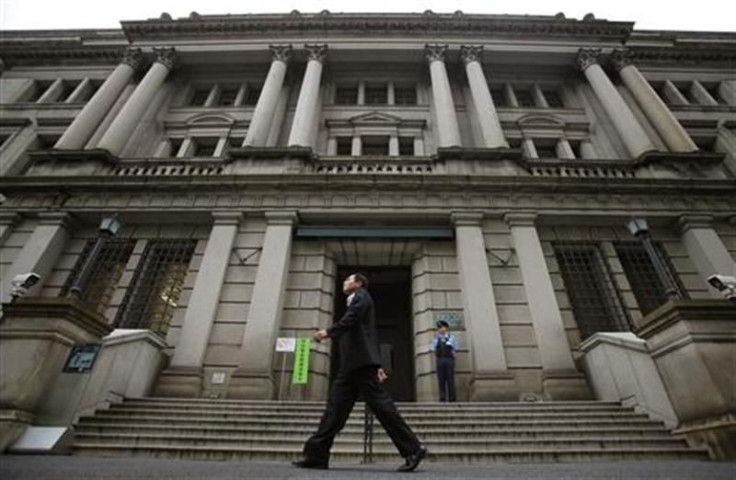Bank Of Japan Eases Monetary Policy In Surprise Move

The Bank of Japan on Wednesday announced an aggressive expansion of its monetary easing program, following similar easing steps by the U.S. Federal Reserve and the European Central Bank.
Stocks in Tokyo jumped to lead Asian markets higher. Japan’s Nikkei Stock Average rallied 1.2 percent as the yen weakened against all 16 major peers.
The Federal Reserve last week announced another round of quantitative easing, and earlier this month the European Central Bank unveiled an open-ended sovereign debt-buying program in an attempt to lower the struggling euro zone countries' borrowing costs and counter market speculation about the breakup of the euro.
The Bank of Japan unexpectedly increased the size of its asset purchases by ¥10 trillion ($126.7 billion) to about ¥80 trillion. And it said it would make those purchases through the end of 2013, a six-month extension.
The central bank also eliminated a minimum required interest rate on the government bonds it buys.
The bank’s decision to do more was backed up by its gloomier view of the economy. The Bank of Japan downgraded its assessment for September. The government last week likewise cut its economic assessment, for the second straight month.
"There remains a high degree of uncertainty about the global economy," the central bank said in a statement released with the rate decision. "The pickup in economic activity has come to a pause," it said, forecasting that activity will remain flat.
Under the new program, the central bank will purchase an additional ¥5 trillion of Japanese government bonds by the end of December 2013 and an additional ¥5 trillion of short-term government bills by the end of June 2013.
In its unanimous policy decision, the bank kept the benchmark interest rate between zero and 0.1 percent and maintained a separate fund that extends credit to banks at ¥25 trillion.
The Bank of Japan’s move took the market by surprise.
“The market [including us] had expected the BoJ to make another easing move at the October policy meeting when the BoJ will publish its semi-annual economic outlook,” Societe Generale analyst Kiyoko Katahira wrote in a note to clients. “However, the easing happened earlier.”
The strong yen, which erodes overseas earnings while making Japanese exports more expensive in global markets, has hurt Japanese manufacturers who are already suffering from weak global and domestic demand.
Industrial production fell 1.2 percent in July from June compared with forecasts for a 4.5 percent increase.
Meanwhile, Japan's exports slumped the most in six months in July as shipments to Europe and China tumbled. The 8.1 percent annual fall was far deeper than economists' median forecast of a 2.9 percent drop.
The outlook for coming months is even gloomier. Manufacturers surveyed by Japan's trade ministry expect output to barely inch up 0.1 percent in August and slide 3.3 percent in September.
© Copyright IBTimes 2024. All rights reserved.






















